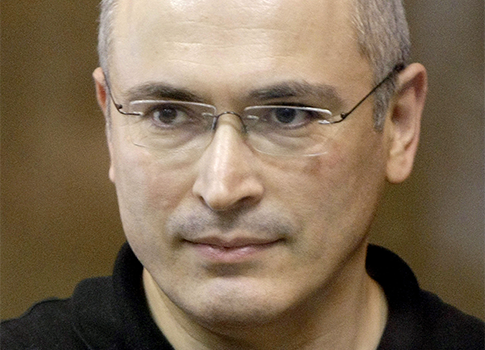Mikhail Khodorkovsky, who has spent much of the past decade in Siberian labor camps, will have his 13-year jail sentence reduced. According to Reuters, the fierce critic of Russian President Vladimir Putin will be released from prison in October 2014.
A Russian court reduced former oil tycoon Mikhail Khodorkovsky's jail sentence for embezzlement by two years on Thursday, clearing the way for one of President Vladimir Putin's fiercest critics to walk free in October 2014.
Khodorkovsky, once Russia's richest man, is serving a 13-year sentence near the Arctic circle on charges of multi-million dollar tax evasion and money laundering, a punishment seen by Putin's critics as a politically-motivated act of revenge.
One of the young tycoons who built fortunes after the Soviet Union's 1991 collapse, Khodorkovsky, now 49, had appeared to defy calls by the president for rich businessmen, or oligarchs, to stay out of politics.
After his arrest, in 2003, his Yukos oil company was broken up and sold off, mainly into state hands.
Once freed, some believe he could unite Russia's fragmented opposition to pose a serious challenge to Putin, though he has played down such speculation.
Putin once dismissed Khodorkovsky's case by saying thieves must sit in jail. But asked about the ruling on Thursday, he said he bore no grudge against him, saying he had not played any role in the court's decision.
"As for Mikhail Borisovich (Khodorkovsky), there was no personal persecution ... This is a purely an economic crime. The court took its decision," Putin told his annual news conference.
Although Putin denies any involvement in Khodorkovsky’s arrest, it is widely believed that the arrest was a way for Putin to send a message to Russia’s wealthy oligarchs that there will be consequences for challenging him politically.
Khodorkovsky, once the richest man in Russia and former CEO of Yukos Oil Company, became an outspoken opponent of Putin.
Khodorkovsky directly challenged Putin on government corruption and instances of Russian officials pocketing millions in bribes during a 2003 meeting at the Kremlin. Putin remarked in private, "I have eaten more dirt than I need from that man." Khodorkovsky was arrested later that year.
The arrest was also seen as a way for Putin to solidify the oil industry as a state monopoly. As explained by Professor Allen Lynch of the University of Virginia in his book, How Russia is Not Ruled, "the crux of the arrest seems less Khodorkovsky’s political meddling per se as it does his plans to merge with ExxonMobil and the Russian firm Sibneft." The merger would have established Yukos as a "private oil giant on a global scale" and allow it to "dominate the future oil pipeline network."
Putin’s state is critically dependent on energy receipts for its fiscal stability, which made the rise of Yukos a direct threat to his regime. Following Khodorkovsky’s arrest, Yukos was broken up and sold off, mainly into state hands.
Even while in prison, Khodorkovsky has continued to make his mark on Russian politics. Most recently, he released a scathing statement regarding the arrest of punk-rock band Pussy Riot.
"The word ‘trial’ is applicable here only in the sense in which it was used by the Inquisitors of the Middle Ages," wrote Khodorkovsky. "I am very ashamed and hurt. And not because of these girls—the mistakes of youthful radicalism can be forgiven—but for the state, which is profaning our Russia with its complete and utter lack of conscience."
